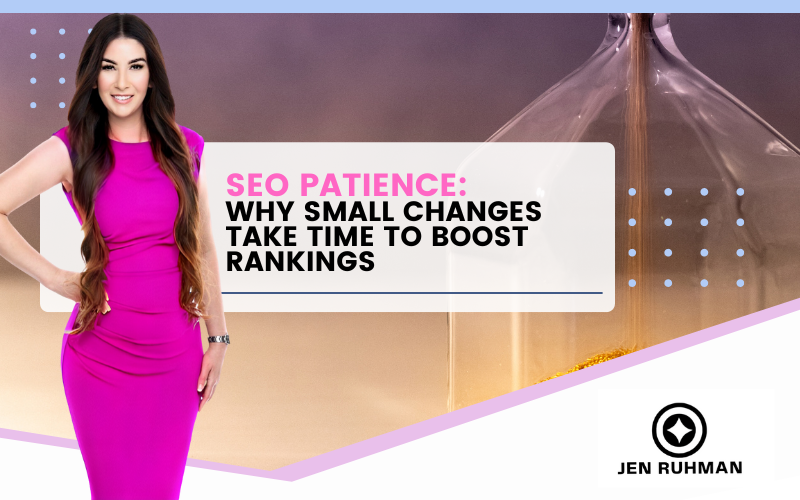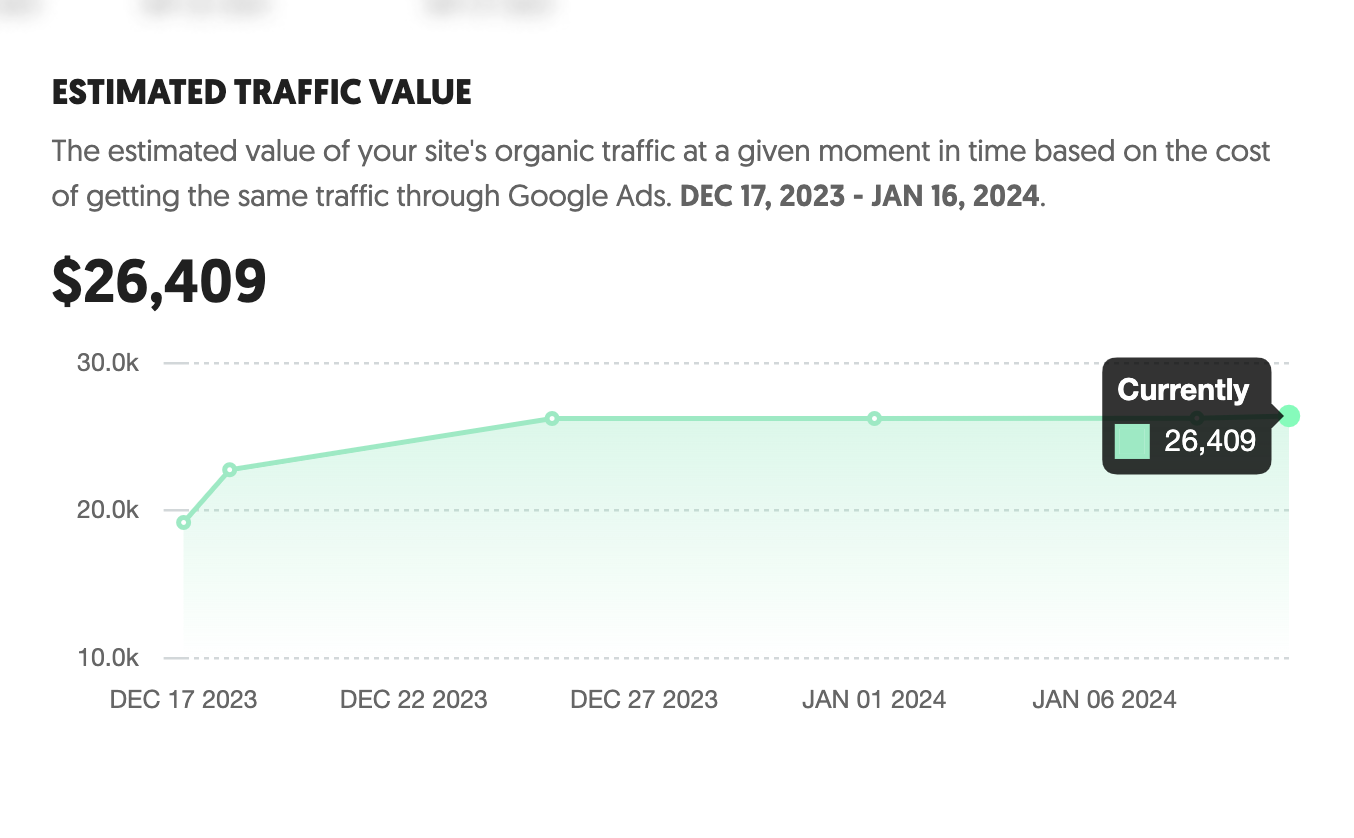
Mar 8, 2024 | SEO Tips

Unfortunately, people think that if you “just do this one thing- you’ll rank #1 in Google.”
UGH- there are many people online trying to over-promise and deliver nothing when it comes to SEO.
Spoiler alert! There’s no “QUICK FIX” for SEO.
Scrolling social media, I see ads that promise such crazy things as:
- “10 clients per day by using our secret formula…” – nope there is no secret formula…
- “We can rank you in 30 days or you pay nothing” – nope they make you pay…
- “Just quickly change this h1 tag and you’ll rank #1” – nope, dream on…
Oh boy, do I hear nightmare stories from people calling me for SEO help.
Let’s face it, SEO can feel like a waiting game. You tweak a title tag here, optimize an image there, and then…crickets. No surge in traffic, no meteoric rise to the top of search results. You might be wondering – is any of this even working?
While making changes like updating your H1 tag is definitely a step in the right direction, it’s important to understand that SEO is a long-term game, not a quick fix. Here’s why those changes might not lead to an immediate jump in ranking:
1. Google Needs Time to Notice:
Think of Google’s search engine as a giant library with a complex filing system. When you make changes to your website, it takes time for Google’s crawlers to find and process those updates. This crawling and indexing process can take days or even weeks.
2. Ranking is a Multi-Faceted Beast:
There are hundreds of factors that Google considers when ranking websites. While H1 tags and keywords are important, they’re just a piece of the puzzle. Backlinks, website speed, mobile-friendliness, and the overall quality of your content all play a role.
3. Patience is a Virtue (and a Ranking Factor):
Building a strong SEO foundation takes time and consistent effort. Creating high-quality content, earning backlinks from reputable sites, and optimizing your website for technical factors all contribute to your website’s authority in Google’s eyes. This authority is what ultimately leads to higher rankings.
Focus on Long-Term Gains:
Instead of getting discouraged by a lack of instant results, view these optimizations as investments in your website’s future. Keep creating valuable content, focus on user experience, and monitor your progress over time. You’ll be much better positioned for sustainable growth in search rankings.
Remember: Consistent effort is key. By making regular improvements and tracking your results, you can watch your website climb the search ladder rung by rung. And that’s a much more satisfying climb than a one-time, short-lived jump!
Unleash the Long-Term SEO Potential of Your Website
While SEO isn’t an overnight magic trick, it’s a powerful tool to drive sustainable growth for your online presence. Partner with our San Diego SEO company and develop a data-driven strategy to achieve:
- Increased organic traffic
- Improved search ranking visibility
- Enhanced user experience
Let’s work together to build a strong SEO foundation that gets results. Contact us today for a free consultation!
Call or text me at: (619) 719-1315

Feb 20, 2024 | SEO Tips

In today’s digital landscape, your website content is no longer just an online brochure – it’s a living, breathing entity that needs constant care and attention. While having a website at all is a good start, neglecting its content is like forgetting to water your prized garden. It might survive for a while, but it won’t reach its full potential.
Updating your website content isn’t just a technical SEO task; it’s an opportunity to boost your traffic, engage your audience, and ultimately, achieve your business goals. Here’s why keeping your content fresh is no longer just a “best practice,” but a necessity:
Attract new visitors:
Search engines and users alike favor fresh, relevant content. By regularly updating your website, you show Google you’re active and engaged, potentially boosting your ranking in search results. This increased visibility attracts new visitors who might not have found you before.
Engage your audience:
Outdated content quickly becomes uninteresting and irrelevant. By refreshing your content with current information and engaging formats, you keep your audience hooked, encouraging them to stay longer and explore more.
Boost conversions:
Fresh content doesn’t just attract visitors; it converts them. By addressing current trends and user needs, you provide content that resonates with your audience, making them more likely to take action, whether it’s subscribing to your newsletter, buying your product, or contacting you for services.
Build trust and authority:
Consistently updating your website demonstrates your commitment to providing valuable information and staying ahead of the curve. This builds trust and positions you as a thought leader in your industry, attracting higher-quality leads and customers.
Here’s how to unlock the benefits of fresh content:
- Focus on quality: Content should be well-written, informative, and relevant to your target audience. Ensure accuracy and cite sources when necessary.
- Address current trends: Research and include information on relevant industry trends and user interests.
- Incorporate multimedia: Videos, infographics, and interactive elements can enhance engagement and make your content more dynamic.
- Optimize for search engines: Use relevant keywords naturally throughout your content, but prioritize human-readable text over keyword stuffing.
- Measure and adapt: Track your content’s performance using analytics tools and adjust your strategy based on what resonates with your audience.
Remember, updating your website isn’t a one-time thing. It’s an ongoing process that requires dedication and strategic planning. But by consistently refreshing your content, you can unlock your website’s full potential and achieve your online goals.
Additional tips:
- Create a content calendar: Plan updates in advance to ensure consistency and avoid scrambling.
- Utilize analytics tools: Use data to identify what’s working and what needs improvement.
- Seek professional help: If you lack time or resources, consider partnering with a content marketing agency.
By investing in fresh, high-quality content, you’re not just making your website look good; you’re investing in your business’s future success. So, what are you waiting for? Start updating your website content today and watch your online presence bloom!
Need help keeping your website fresh? I can help!
Partner with our San Diego SEO company and witness your online visibility skyrocket! Initiating the process is straightforward – simply connect with us, and we’ll devise strategies to amplify your digital presence. Reach out for specialized SEO support:
There’s no need to hold back – you’re invited to call or text us at: (619) 719-1315 Proudly located in the lively city of San Diego, CA. Let’s join forces and take your website’s SEO to the next level! Here’s to our future success together!

Jan 17, 2024 | SEO Tips

Introduction to SEO and Its Significance
In today’s digital age, the importance of Search Engine Optimization (SEO) cannot be overstated. We often hear the term SEO, but what does it really mean? Simply put, SEO is the art and science of optimizing your online content so that a search engine likes to show it as a top result for searches of a certain keyword.
Why SEO Matters in the Digital World
With millions of websites vying for attention, standing out in the vast ocean of online content is crucial. SEO is the beacon that guides potential customers to your website through the clutter. It’s about understanding what people are searching for online, the answers they are seeking, the words they’re using, and the type of content they wish to consume.
Maximizing Online Visibility: A Success Story in SEO

Here’s a screenshot from my client’s ubersuggest SEO dashboard showing their monthly SEO estimated traffic value
Substantial Savings Through Strategic SEO
Check out the results my San Diego SEO company delivered for another local business. One of my esteemed clients has experienced a remarkable boost in their online presence since partnering with our SEO services. Utilizing the sophisticated analysis provided by UberSuggest’s SEO tool, we’ve identified that they are now reaping the benefits of an estimated $26,000 worth of free organic traffic each month.
The Value of SEO Over Paid Advertising
This impressive figure represents the potential cost they would have incurred had they opted for paid advertising through Google AdWords to achieve the same level of traffic. By investing in our monthly SEO services, they’ve effectively sidestepped these substantial advertising costs. Instead, they’re enjoying a significant influx of organic visitors, thanks to our tailored SEO strategies that enhance their online visibility and search engine ranking. This success story underscores the immense value of SEO in today’s digital marketplace, offering tangible, cost-effective results that go beyond traditional paid advertising methods.
Understanding Google’s Algorithms
How Google Ranks Websites
Google uses complex algorithms to rank websites. These algorithms consider various factors like keyword relevance, site speed, mobile-friendliness, and user experience.
The Role of Keywords in SEO
Keywords are the cornerstone of SEO. They are the words and phrases that searchers use in Google. Optimizing your content with the right keywords can significantly increase the chances of your website appearing in top search results.
The Benefits of SEO for Businesses
Increased Visibility and Brand Awareness
SEO helps in increasing the visibility of your website, leading to more traffic and brand awareness.
Cost-Effectiveness of SEO
Unlike paid advertising, SEO provides a cost-effective way to attract organic traffic. It’s an investment that pays dividends over time.
Strategies for Effective SEO
On-Page SEO: Optimizing Content and Structure
On-page SEO involves optimizing the content and structure of your website. This includes using relevant keywords, creating high-quality content, and optimizing HTML tags.
Off-Page SEO: Building Backlinks and Online Presence
Off-page SEO refers to actions taken outside of your own website to impact your rankings within search engine results pages (SERPs). This includes building backlinks from other websites.
The Role of Content in SEO
Creating Quality Content that Ranks
Content is king in the world of SEO. The creation of engaging, informative, and relevant content is essential for ranking higher in search results.
Balancing Keywords and Readability
While keywords are crucial, it’s important to balance them with readability. Overstuffing keywords can harm your SEO efforts.
The Future of SEO
Adapting to Algorithm Changes
SEO is an ever-evolving field. Staying updated with Google’s algorithm changes is crucial for maintaining high rankings.
The Growing Importance of Voice Search and AI
With the rise of voice search and AI, optimizing for these new technologies is becoming increasingly important in SEO strategies.
SEO is an invaluable tool for businesses looking to increase their online presence and attract organic traffic. By understanding and implementing effective SEO strategies, businesses can significantly enhance their online visibility and reach.
Ready to Elevate Your Business’s SEO in 2024?
Join forces with us and watch your online presence soar! It’s simple to start – reach out and let’s discuss strategies to boost your digital footprint.
Reach Out to Jen Ruhman for Professional SEO Assistance:
Stop being shy -You’re welcome to call or text me: (619) 719-1315 🙂
Located in sunny San Diego, CA.
Let’s collaborate and propel your website’s SEO to new heights! woo hooo!

Dec 29, 2023 | SEO Tips

In 2024, the digital landscape continues to evolve rapidly, making SEO more crucial than ever for business success. The right SEO strategies not only boost your website’s visibility but also enhance its credibility and user engagement. This comprehensive guide delves into the most effective SEO strategies to keep your business ahead of the curve.
Understanding SEO
Evolution of SEO
Over the years, SEO has shifted from simple tactics like keyword stuffing and backlinking to more sophisticated methods. These changes reflect the evolving algorithms of search engines that now prioritize user experience, content relevance, and quality. Understanding this evolution is key to implementing effective SEO strategies.
Importance in 2024
In today’s digital era, SEO is not just about improving rankings; it’s about building a strong online presence. With the internet becoming more crowded, appearing at the top of search results is crucial for businesses to attract and retain their target audience. SEO in 2024 is about creating a trustworthy and authoritative digital footprint.
Key Strategies
Keyword Research
Modern keyword research involves understanding what your audience is searching for and why. It’s about analyzing search queries to grasp user intent and tailoring content to meet these needs. This approach ensures that your website attracts relevant traffic, leading to higher engagement and conversion rates.
User Experience (UX)
UX in SEO refers to how easily and pleasantly users can navigate and interact with your website. Websites with a clear structure, fast loading times, and engaging design tend to rank higher. Improving UX is essential for keeping visitors on your site longer, reducing bounce rates, and increasing the likelihood of conversions.
Mobile Optimization
As mobile internet usage surpasses desktop, having a mobile-optimized website is imperative. This means ensuring your site is responsive, loads quickly on mobile devices, and offers an enjoyable user experience. Mobile optimization affects not only user satisfaction but also search engine rankings.
Content Quality
High-quality, informative, and engaging content is the cornerstone of successful SEO. In 2024, content must be not only well-written but also valuable and relevant to your audience. Quality content helps in establishing your website as an authority in your field, encouraging backlinks and repeat visits.
Voice Search Optimization
With the rise of voice assistants, optimizing for voice search is increasingly important. This involves focusing on natural language, question-based queries, and local search terms. Voice search optimization can significantly increase your visibility in this growing search segment.
Local SEO
Local SEO is vital for businesses serving specific geographic areas. It involves optimizing your website for local search queries and ensuring your business is listed accurately on maps and local directories. Local SEO helps in attracting customers in your vicinity and is crucial for small and medium-sized businesses.
Analytics and Tools
Utilizing SEO Tools
SEO tools are essential for tracking your website’s performance, researching keywords, analyzing competitors, and identifying areas for improvement. These tools provide valuable insights that help refine your SEO strategy and ensure your efforts are aligned with your business goals.
Understanding Analytics
Website analytics provide data on user behavior, traffic sources, engagement metrics, and more. By analyzing this data, you can understand what works and what doesn’t, enabling you to optimize your website for better performance and higher search engine rankings.
Future Trends
AI and Machine Learning
AI and machine learning are transforming SEO by automating tasks, predicting trends, and offering personalized experiences to users. They enable more sophisticated analysis of data and user behavior, leading to more targeted and effective SEO strategies.
Increased Personalization
SEO is moving towards increased personalization, where content and user experiences are tailored to individual preferences and behaviors. This trend emphasizes creating more relevant and engaging user experiences, improving both satisfaction and conversion rates.
Sustainability in SEO
Sustainable SEO refers to strategies that are designed for long-term success rather than quick wins. This includes focusing on quality content, ethical practices, and adaptable strategies that can withstand changes in search engine algorithms and market trends.
In 2024, hiring a reputable SEO company is a crucial step for businesses seeking to excel in the digital landscape. Such a company can expertly focus on user experience, craft quality content, and adapt to the ever-changing online trends. This strategic approach ensures sustained online success and a significant competitive advantage for businesses.
Looking to boost your business’s SEO in 2024?
Let’s make it happen together! Starting is easy – just get in touch, and we can explore ways to enhance your online presence.
Contact Jen Ruhman for expert SEO Services:
Feel free to give me a call or send a text:
(619) 719-1315 Based in sunny San Diego, CA. Let’s team up and take your website’s SEO to the next level!

Dec 5, 2023 | SEO, SEO Tips
Boost Your TripAdvisor Visibility: A Jen Ruhman Guide to Mastering SEO for Your Business Listing

Why TripAdvisor Matters for Your Business
The Power of Online Reviews
In today’s digital era, TripAdvisor has emerged as a pivotal platform for businesses in the hospitality and travel sector. Its vast user base and influence make it an essential tool for enhancing visibility and attracting potential customers. But how do you ensure your business stands out on TripAdvisor? The answer lies in effective SEO strategies tailored for TripAdvisor.

Understanding TripAdvisor’s Algorithm
How TripAdvisor Ranks Businesses
Key Factors Influencing Your TripAdvisor Ranking
TripAdvisor’s algorithm is a complex system that decides how businesses are ranked. Understanding the factors that influence this ranking, such as the quality and quantity of reviews, the recency of reviews, and user engagement, is crucial for optimizing your TripAdvisor profile.
Crafting a Winning TripAdvisor Profile
Essential Elements of Your Profile
Optimizing Each Component for Maximum Impact
A compelling TripAdvisor profile is more than just a list of services. It involves a strategic presentation of your business, including high-quality images, detailed descriptions, and a complete listing of amenities and services. Each element should be optimized to improve your search visibility on TripAdvisor.
Leveraging Reviews for Higher Rankings
Encouraging Customer Reviews
Responding to Reviews: A Key SEO Strategy
Reviews are the lifeblood of TripAdvisor SEO. Encouraging your customers to leave reviews and responding to them promptly and professionally can significantly boost your TripAdvisor ranking.
Building a Strong Online Presence Beyond TripAdvisor
Linking Your TripAdvisor Profile to Your Website
Social Media Integration and Its Benefits
Having a robust online presence is vital. Linking your TripAdvisor profile to your website and integrating it with your social media platforms can drive more traffic and improve your overall online visibility.
Local SEO and Its Impact on TripAdvisor Rankings
Understanding the Role of Local SEO
Tips for Boosting Local SEO for Your TripAdvisor Profile
Local SEO plays a significant role in TripAdvisor rankings. Ensuring your business is listed accurately on local directories and maps, and using location-based keywords in your TripAdvisor profile, can enhance your visibility to local audiences.
Advanced TripAdvisor SEO Tactics
Utilizing Keywords Effectively
Harnessing the Power of Visual Content
While TripAdvisor isn’t a traditional search engine, using relevant keywords in your profile and review responses can help. Additionally, high-quality visual content can significantly enhance user engagement and SEO performance.
Monitoring and Analyzing Your TripAdvisor Performance
Tools and Techniques for Tracking Success
Making Data-Driven Decisions
Regularly monitoring your TripAdvisor performance using analytics tools can provide valuable insights. This data can help you fine-tune your SEO strategies and make informed decisions to improve your ranking.
- Stay Fresh and Updated: Keep your listing as current as your business. New services? Changed your hours? Tell the world.
- Show Off Your TripAdvisor Street Cred: Got awards or high ratings? Flaunt them on your website and in your marketing. It’s like wearing a badge of honor.
- Be a Local SEO Hero: Make sure your business is listed correctly on Google Maps and other local directories. It’s a sneaky way to boost your TripAdvisor game.
Conclusion: Maximizing Your TripAdvisor Potential
The Continuous Journey of TripAdvisor SEO
Embracing Change and Staying Ahead
TripAdvisor SEO is an ongoing process. Staying updated with the latest trends, continuously optimizing your profile, and actively engaging with your audience are key to maintaining and improving your TripAdvisor ranking.

Are you eager to bestow the gift of SEO on your business or perhaps a friend?
Getting started is a breeze. Just reach out to me, and let’s chat about boosting your online presence together.
Contact me, Jen Ruhman, for SEO Services:
Give me a Call or Text at:
(619) 719-1315
Based in: San Diego, CA Hire me today, and let’s jumpstart your website’s SEO adventure!

Oct 27, 2023 | SEO Tips
When we delve into the realms of content creation and digital marketing, one term that frequently crops up is “editorial content.” But what exactly does this term entail? In this comprehensive guide, we’ll explore the nuances of editorial content, its significance, and how it stands apart from other types of content.

Defining Editorial Content
Understanding Editorial Content Editorial content can be broadly defined as any material in written, visual, or audio form that expresses opinions, insights, or provides in-depth information on a particular topic, subject, or issue.
Characteristics of Editorial Content
Opinionated and Insightful At its core, editorial content is characterized by its opinionated nature. It often reflects the viewpoints, beliefs, and values of the author or the publication’s editorial board.
Well-Researched and Informative Despite being opinionated, high-quality editorial content is always well-researched and backed by facts and evidence. This ensures that the content is not just a rant but an informed opinion that adds value to the reader.
Engages and Provokes Thought Editorial content aims to engage its audience, provoke thought, and initiate discussions. It encourages readers to reflect on issues, form their own opinions, and participate in broader conversations.
The Role of Editorial Content
Building Credibility and Trust Editorial content plays a crucial role in building the credibility and trustworthiness of a publication or a brand. By expressing opinions and providing well-researched insights, it establishes the author or brand as an authority in their field.
Influencing Public Opinion
Shaping Perceptions Through its opinionated nature, editorial content has the power to influence public opinion and shape perceptions on various issues.
Driving Change Beyond just influencing opinions, editorial content can also drive social, political, and economic changes by raising awareness, highlighting issues, and advocating for change.
Different Types of Editorial Content
Opinion Pieces and Commentaries These are pieces where authors express their personal opinions on topics. They are subjective but should still be grounded in facts and logical reasoning.
Analysis and Interpretation This involves providing in-depth analysis and interpretation of events, trends, or data. It goes beyond just reporting facts and adds value through expert insights and context.
Reviews and Critiques Editorial content also encompasses reviews and critiques of products, services, books, films, and more. These pieces provide evaluations based on the author’s experiences and criteria.
Creating Effective Editorial Content
Understanding Your Audience Knowing your audience is crucial when creating editorial content. Understanding their interests, beliefs, and values helps in crafting content that resonates with them.
Maintaining a Balance
Balancing Opinions and Facts While editorial content is opinionated, maintaining a balance between opinions and facts is essential. This ensures credibility and helps in building trust with your audience.
Avoiding Sensationalism It’s important to avoid sensationalism and hyperbole. Staying true to the facts, even while expressing opinions, ensures that the content is taken seriously and respected.
The Future of Editorial Content
Adapting to Changing Trends The world of content is ever-evolving, and editorial content is no exception. Adapting to changing trends, technologies, and audience preferences is key to staying relevant and effective.
Embracing New Formats and Channels
Expanding Beyond Text With the rise of video, podcasting, and other formats, editorial content is expanding beyond traditional text-based articles. Embracing these new formats and channels can help in reaching wider audiences and staying ahead in the content game.
Editorial content is a powerful tool in the arsenal of content creators and marketers. It builds credibility, influences opinions, engages audiences, and drives change. By understanding its nuances, characteristics, and role, and by creating high-quality, balanced, and engaging editorial content, we can leverage its full potential to connect with audiences, establish authority, and make a lasting impact.
FAQs
- What makes editorial content different from other types of content?
- Editorial content is opinionated, insightful, and aims to engage and provoke thought, making it distinct from other more straightforward, objective types of content.
- How does editorial content build credibility?
- By expressing informed opinions, providing insights, and establishing authority on topics, editorial content builds credibility and trust with audiences.
- Can editorial content be in formats other than text?
- Yes, editorial content is evolving to include video, audio, and other formats, expanding its reach and engagement.
- Is it important to balance opinions and facts in editorial content?
- Absolutely, maintaining a balance between opinions and facts is crucial in editorial content to ensure credibility and trustworthiness.
- How does editorial content influence public opinion?
- Through its opinionated nature and ability to engage audiences, editorial content has the power to shape perceptions and influence public opinion on various issues.
Do you want to boost your website’s visibility?
Optimizing your website for search engines is a proven strategy to attract more visitors. With our monthly SEO services, your website can climb the Google rankings, resulting in increased leads and sales.
At Jen Ruhman SEO, we’re one of the top SEO companies in San Diego – our goal is to aid in the online growth of your business. We are confident that an effective SEO plan can lead to substantial growth in both traffic and revenue. Recognized as a leading SEO firm in San Diego, CA, we are just a phone call away when you need our assistance.
Book a complimentary consultation with us today!











